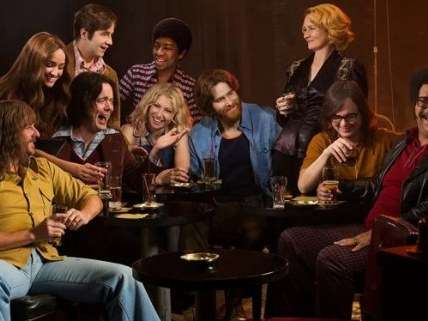I'm Dying Up Here Wants Viewers to Take the Saying Literally
Stand-up comics' pursuit for laughs presented as life-or-death drama.

I'm Dying Up Here. Showtime. Sunday, June 4, 10 p.m.
Somebody—Harry Shearer? Al Franken? Memory and Google both fail me—describing one of the grisly bloodbaths among the cast in the early day of Saturday Night Live once said, "It's not comedy if somebody's not crying." That's very much the idea behind Showtime's I'm Dying Up Here, a melodrama about the lives of a group of young stand-up comics scuffling through the comedy-club dives of Los Angeles as they wait for their big break.
In the world of I'm Dying Up Here, comics succeed not by telling jokes but by ripping their own hearts out on stage. They achieve authenticity not by getting laughs but by dishing their secret fears, avarices and perversions to a bunch of voyeuristic strangers. "These are tortured souls who leave it all out there every night," declares Goldie, the owner of the seedy club where most of the show takes place. "That volatility, that pain—that's the price of brilliance."
If this seems a bit of an overwrought view of, say, Jay Leno's monologues or Steve Martin's salute to King Tut, you've already zeroed in on the weakness at the heart of I'm Dying Up Here: its relentless pretension. Successful stand-up comedy does not require emotional vivisection any more than successful portraiture requires auriculectomy. The fact that a particular artist is neurotic does not make neurosis a job requirement. When the show's characters start talking about the nature of art, they sound like a sophomore English colloquium meeting at a beer garden.
But considered for what it really is—a sharply observed soap opera about a wholly debauched and dysfunctional group of friends preying upon their mutual insecurities—I'm Dying Up Here offers considerable viewing pleasure.
The show is based on a non-fiction book of the same name about the Los Angeles comedy scene of the early 1970s, when Pet Rock jokes were the order of the day and comics like Leno, Andy Kaufman and Robin Williams were trying to break in.
Executive producer and creator Dave Flebotte (whose wildy disparate writing credits include everything from The Sopranos to Desperate Housewives) has elected to fictionalize his story. And although some elements are nonetheless unmistakable—particularly Goldie and her eponymous comedy club, who strongly resemble L.A.'s Comedy Store and its skinflint owner Mitzi Shore—it's a mistake to watch with a scorecard, trying to match real comedians to fictional counterparts. I'm Dying Up Here's characters are very much its own creations.
They scrape by on gigs that that barely cover the cost of an overpriced Sunset Strip burger, picking up side work as game-show contestants or sexual Tinkertoys when that fails. They sleep in walk-in closets rented for $60 a week and comfort one another with bromides of the business. ("Lenny Bruce's first paying gig was for $12 and a plate of spaghetti!") And they wait to be "Discovered," which is generally defined as a spot on The Tonight Show (especially if Johnny Carson summons you over to the couch to chat after your bit).
But in lean times, even getting invited to play the upstairs lounge at Goldie's—as opposed to the truly tawdry basement—will do. Both venues pay the same: nothing. Meanwhile, Goldie herself—the troupe's den mother to those on the way up, Cruella de Vil to everybody headed the other way—sits in the back cutting business deals over pizza-pans of cocaine.
The passengers on this voyage of the damned endlessly reconfigure themselves for various acts of sexual piracy, backstabbing, career sabotage, and ultimately shoulder-crying. At times they seem linked mainly by a seemingly endless capacity for self-denigration if that's what it takes to prove their authenticity to Goldie. Texas oil princess Cassie (Ari Graynor, Bad Teacher) spews blowjob jokes. Self-lacerating chicano Edgar (Al Madrigal, The Daily Show) has a lot of scabrous jokes but only one punch line: "Mexico!"
The most jaded of the lot is Angry Young Man Bill Hobbs, played by Andrew Santino of Mixology. (I know I said a few paragraphs back not to watch I'm Dying Up Here, but it's pretty hard not to see a close resemblance between Hobbs and Bill Hicks, the Texan standup who burned brightly for a while in the 1990s before melting down into frothing nutjob raves about the Kennedy assassination.) When one of the other comics finally makes it to The Tonight Show (and Johnny's couch, too!) he's the only one to admit he's seething with jealousy—and warns the rest of the group that they ought to be, too.
"Every other comic's success—every set he kills, every Merv, Johnny or Dinah fucking Shore appearance he makes—is one more that we didn't get," he rants at what's supposed to be a congratulatory party. "Every laugh should feel like a sharp poke in your fucking eye."
Even by soap-opera standards, that's jagged terrain, and there are times when I'm Dying Up Here seems less like the show's title than a literal cry for help.
But there's plenty of stuff to leaven the mix, including the brassy but wistful performance of Graynor and the hard-as-nails one by Melissa Leo (Treme) as Goldie. And then there's the comedy itself, which is often howlingly funny. Behold Cassie mousetrap a drunken heckler who repeatedly shouts "Show me your tits!" during her act. Learning he's part of a bachelor party, she chides him: "What are you doing in here? That hooker in the trunk ain't gonna bury herself."


Show Comments (20)